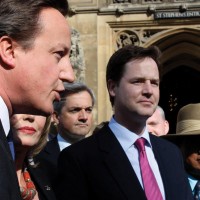
This week, it’s 2010.
- Average house price: £162,249
- Base rate at year-end: 0.5%
- House price inflation: 0.1%
- General inflation: 3.29%
- Oscar Best Picture winner: The Hurt Locker
- Best-selling album: Progress, Take That
- Must-have Christmas toy: Jet Pack Buzz Lightyear
- Christmas number one: When We Collide, Matt Cardle
Mortgage/housing market highlights
In the first year for the coalition government, key challenges in housing included the supply of housing stock failing to keep pace with demand as the impact of the credit crunch meant that private builders reduced the supply of new housing. In order to tackle this and promote greater mobility within the market, the government introduced what it described as ‘the most radical reform of social housing in a generation’. Councils were granted more flexibility to use their social housing stock to the maximum effect and drive down waiting lists, which stood at 5 million people at the time of implementing the plans. Housing associations were also given the option to offer new affordable rents and use this revenue to build more affordable homes.
Meanwhile, data from the Council of Mortgage Lenders showed that mortgage lending stabilised in 2010 following very sharp falls in 2008 and 2009. There were 529,300 loans advanced for house purchase in 2010, worth £77.1bn, an increase of 3% by volume and 11% by value compared with 2009. Loans for remortgage were at a 13-year low, following the global financial crisis.
According to the British Bankers’ Association, mortgage approvals in November dropped by 32% year-on-year, while net lending slowed by 56%.
Findings published by Countrywide in July 2010 found that 72% of all applications in June were for fixed-rate mortgages as UK homemovers anticipated a rise in interest rates. Commenting on the research, Grenville Turner, Countrywide’s group chief executive, said: “The recent Bank of England Credit Conditions report revealed that lenders are becoming nervous about the cost of wholesale lending – if this transpires into the mortgage market through tightened lending criteria, we will see a significant impact that could damage any chance of a recovery in the property and mortgage markets.”
The year’s highlights
26 January – The Office for National Statistics announced that the UK was no longer in recession, with gross domestic product having grown by 0.1%, a weaker rise than many economists had expected.
3 February – Opinion polls indicated that Labour had reduced the Conservative lead to as little as seven points, increasing the possibility of a hung parliament after the forthcoming general election.
12 March – The Unite union which represents British Airways cabin crew announced two rounds of strike action for three days from 20 March and four days from 27 March.
15 April: A cloud of volcanic ash from the eruption of Eyjafjallajökull in Iceland caused the closure of airspace over the United Kingdom and northern and western Europe.
6 May – The 2010 general election took place, resulting in a hung parliament. The Conservative Party won a plurality of seats, 306 of the 649 contested, placing them 20 seats short of an overall majority in the House of Commons, whilst the Labour Party won 258 seats, and the Liberal Democrats 57.
7 May – The Conservative Party and the Liberal Democrats began negotiations to reach either a parliamentary agreement, or to create a coalition government with a House of Commons majority.
17 May – The Chancellor of the Exchequer George Osborne announced the creation of the Office for Budget Responsibility to take over the Chancellor’s role of economic and fiscal forecasting.
20 June – The death toll of British forces in Afghanistan reached 300 in nine years when a Marine died of his injuries in Queen Elizabeth Hospital, Birmingham, after being wounded in Helmand.
22 June – Chancellor George Osborne presented the coalition government’s emergency budget statement to the House of Commons. The most notable changes include a 2.5% increase in VAT to 20% and a 25% reduction in public spending.
29 July – The government announces that, as from October next year, employers will no longer have the right to force workers to leave without paying them off once they turn 65. On the same day Metro Bank opens its first branch in Holborn, London, the first wholly new high street bank for more than a century.
10 September – The government unveils plans to privatise Royal Mail.
25 September – Ed Miliband is elected to become leader of the Labour Party narrowly beating his brother David in the final round of the leadership contest.
October – The Equality Act comes into effect, consolidating legislation requiring equal treatment in access to employment and services regardless of gender, race, health, disability, sexual orientation, belief and age.
5 November – Nigel Farage is re-elected as the leader of the UK Independence Party.
10 November – University students riot outside the Conservative Party headquarters in Millbank, London, in protest against funding cuts and proposals to increase tuition fees.
9 December – The coalition government wins a vote in the House of Commons to raise the cap on university tuition fees in England to £9,000 with a majority of 21.
15 December – Unemployment has risen to 2,500,000 for October; the first monthly rise in six months.
17 December – The British government announces plans to make prisoners serving less than four years eligible to vote.

















